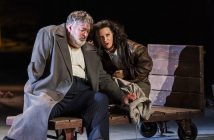Pianist, conductor and UN ambassador for peace, Daniel Barenboim is the man we all wanted to see as we queued for a one-off concert at the Turbine Hall in the Tate Modern, marking his legendary six-decade career.
There was a palpable buzz in the air – no, not from the turbine – as I stood in readiness for Barenboim’s all-Chopin programme. An audience of young and old had gathered to see a legend, showing just how ‘alive’ classical music really is. As Barenboim entered the hall, it occurred to me that he didn’t actually need to play anything, such was the greeting of rapturous applause and a standing ovation from the audience as he took his seat at the piano.
The space had its quirks, certainly. During one of the many speeches he made between his performances, Barenboim said that the idea of playing in the hall “tickled” him. I don’t think the space assisted the acoustic very well at all, though, the sound of the piano often getting lost in the warehouse-like hall but, like a true legend, Barenboim wasn’t fazed by such a thing; his priority was to deliver Chopin’s genius to our ears.
I wish he’d played more, but what he did play was glorious. Accompanied by a quintet of musicians from the Staatskapelle Berlin, with a special arrangement, he opened with the Larghetto (Romance) movement from Chopin’s 1st Piano Concerto, and it was divine. I was whisked into an unworldly state where daily trivialities vanished, as my body was suffused with Chopin’s sumptuous melodies. All I needed to complete the heavenly picture was to sit right up close with my feet up on a Portuguese rosewood-caned settee clutching a glass of red wine (Cabernet, preferably, but I’d take anything, really).
Oddly, Barenboim performed only one movement with the quintet, which disappointed me greatly but, given that this was a promotional concert, I presume that Universal want us to buy the CD to hear the rest.
As he finished, Barenboim went to the edge of the Turbine Hall Bridge to take his bow and acknowledge the 700+ people on the lower floor – those unsuccessful in gaining tickets for the event – at which point I feared he might burst into ‘Don’t Cry For Me Argentina’, but I would have forgiven him; it definitely felt like an Eva Perón moment.
A ‘thank you’ message from the deputy director of the Tate followed, and the microphone was then passed to the maestro who gave a small (for Barenboim) speech on the delights of having an audience still wanting to see him play. “It was at the Royal Festival Hall,” he intoned, “where I first played 55 years ago, and still I am surprised that people want to come.” Judging by the Turbine Hall turnout, I don’t think he will have any problem selling his next London visit.
Among his bon mots on various subjects was a spectacularly witty exchange with a member of the audience who asked if he would play more.
“What would you like me to play?” Barenboim replied.
“Bach,” the woman shouted out from the back.
“Bach? But I am here to play Chopin. I will play his Minute Waltz, is that okay?”
The audience agreed, so he went to sit at the piano and started to play a great-tempered Minute Waltz in true Barenboim style to much applause. We then went back on course and heard Chopin’s Nocturne in D Flat: soft and gentle, although some of it may have been slightly heavy-handed due to the problem with the acoustic, but Barenboim nevertheless manoeuvred the Nocturne to its finishing delights.
Lastly, in more sombre tones, he spoke of governments and their policies on music education, a subject on which he is known for being outspoken and, as a clear ambassador for greater musical education around the world, his appeal for more money to be put into music education is a point echoed throughout his recent book, Everything is Connected: The Power of Music. A great read for anyone who is enthusiastic about music, the book has taught me how to hear things differently which, by return, I feel has enhanced my musical ability, simply through the power of thought; this volume is better than any music theory book you could ever purchase.
Finally, he played Chopin’s F Sharp Major Barcarole, which disappointed me; it was shaky and uncertain, with some missed notes and an unnecessary ‘oomph’, but he did keep it youthful, admittedly. I happen to know that Daniel Barenboim is 21 in mind, music and fingers, although his physical appearance will tell you something different.
As he walked off stage after the Barcarole finale, he passed my row of seats and spotted a woman, perhaps on old friend, whom he hugged and kissed. When she wouldn’t stand as everyone else did, he asked her in humour, “Why are you not standing? Was I bad?”
Daniel Barenboim will return to London for concerts at Wigmore Hall and the Royal Festival Hall later this year. Website.
Photograph: Dominic Lipinski/PA




